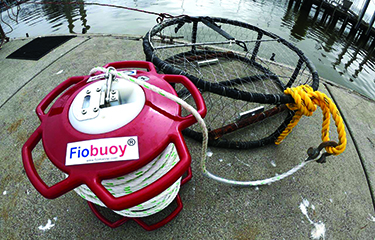A year-long feasibility study to assess using ropeless trap gear in the New England lobster fishery has been launched by the Massachusetts Division of Marine Fisheries.
Funded in part by the National Fish and Wildlife Foundation in partnership with NOAA, the “accelerated timeline” project “will interview dozens of fishermen, technologists, policy experts, and scientists to fully evaluate the challenges and opportunities of the new gear type,” the state agency said in a 21 January statement.
Ropeless gear – sometimes known as pop-up gear, or as Massachusetts officials call it, on-call gear – are designs that seek to replace the traditional floating buoy line gear used in lobster, crab and fish trap fisheries.
There’s high interest in these alternatives as a potential solution to prevent marine mammal entanglements in gear – especially the highly endangered northern right whale, with an East Coast population now estimated to be less than 400 animals.
The gear designs use submerged buoys, activated by time-release mechanisms or signals transmitted from the surface, to surface carrying a line to retrieve the traps.
West Coast fishermen, gear designers and conservation groups have worked at testing ropeless gear for the Dungeness crab fishery, which is subject to shutdowns to lessen dangers of entanglements with migrating humpback whales.
The Massachusetts study would bring that effort to East Coast lobster waters.
“While the body of prior research on ropeless gear has focused on the mitigation of risk to endangered marine life, there is still much to learn about the technological, legal, and regulatory ecosystems of ropeless gear as well as operational and economic unknowns for the region’s fishermen and coastal communities,” according to the Massachusetts announcement. “DMF’s project will build our knowledge on each of these issues and produce a set of recommendations for future policy development and possible implementation.”
A state paper outlining the project acknowledged costs will be an enormous factor.
“We will work across all relevant sectors to evaluate the economic challenges and ramifications of on-call fishing gear, as well as the direct and indirect consequences of its implementation. There are also potential social implications of on-call fishing gear, due to the territorial nature of the lobster fishery and the current methods used by the industry for addressing spatial issues,” the paper stated.
“Ropeless gear represents a sea change for the fishermen who would use it or interact with it on the fishing grounds,” Massachusetts Division of Marine Fisheries Director Daniel McKiernan. “As with any proposed experimental fishing gear type, ropeless gear warrants a thorough analysis, and the urgency of this important conservation and economic issue is motivating our agency to act quickly. Our project will close the loop on the subject by analyzing previously unaddressed opportunities, challenges, and requirements for the use of ropeless fishing gear, while taking the feedback of fishermen, conservationists, and all stakeholders seriously. This project puts the Commonwealth of Massachusetts in a central leadership role advancing marine mammal conservation and fisheries management in an intelligent, equitable, and collaborative manner.”
Reporting by Kirk Moore
Photo courtesy of Oceana







